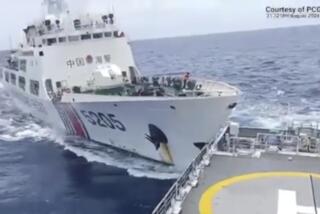Sea encounter prompts vow
WASHINGTON — Secretary of State Hillary Rodham Clinton and China’s foreign minister agreed in talks Wednesday to try to avoid any more incidents such as the interception of a U.S. surveillance ship by Chinese naval vessels, Clinton said.
The confrontation, which occurred Sunday in the South China Sea, is expected to come up again today, when Foreign Minister Yang Jiechi meets with President Obama at the White House.
The Navy surveillance ship Impeccable, towing a sonar sensing device that seeks submarines and other vessels, was harassed by a group of Chinese naval vessels. One of the vessels tried to snag the sonar device, coming within 25 feet of the American ship.
The Chinese government has asserted that the U.S. maneuver was an illegal activity within Beijing’s 200-mile “economic exclusion zone,” a charge American officials insist is based on an inaccurate reading of international law.
Clinton said after meeting with the Chinese official that both sides restated their position, and also agreed “we should work to ensure that such incidents do not happen again.”
A State Department official said Clinton yielded no ground in the meeting, instead “forcefully” restating the U.S. position.
But, discussing the private meeting on condition of anonymity, the official said the Obama administration might be willing to modify some of its procedures to avoid a calamitous encounter.
“There is no compromise here,” said an administration official, also speaking on condition of anonymity. “The U.S. position is that the Impeccable was in international waters.”
This week’s U.S.-Chinese meetings had been scheduled to help plan an upcoming meeting between Obama and Chinese President Hu Jintao, but were overshadowed by the maritime dispute.
Pentagon Press Secretary Geoff Morrell said the incident led the U.S. defense attache in Beijing to contact the Chinese Defense Ministry. The Pentagon summoned the Chinese defense attache in Washington.
“We believe firmly that what that naval ship was doing in those international waters is not only fully consistent with international law, it is common practice,” Morrell said.
The Impeccable was operating in an area of keen interest to the Navy because of a new submarine base in the southern island province of Hainan that is home to some of China’s most sophisticated subs. The Pentagon is monitoring China’s military buildup and is especially interested in arms that might be used in any conflict over Taiwan.
The U.S. and Chinese interpretations of international law differ sharply.
Pentagon lawyers say that although scientific exploration is banned in another nation’s economic zone, military surveys are not. The Chinese have a law on their books banning any kind of foreign military operation in their economic zones.
Bonnie S. Glaser, a China specialist at the Center for Strategic and International Studies in Washington, said the collision in April 2001 of a Chinese fighter plane and a U.S. EP-3 surveillance aircraft, in which the Chinese pilot died, came during a period of increased surveillance of the Chinese coast by American planes.
In the most recent case, there may have been a similarly sharp increase in U.S. surveillance that caught the attention of China’s military.
But she said she doubted that the Chinese want this episode to interfere with building a relationship with the Obama administration.
Clinton stopped in China on her first overseas trip as secretary of State, and top officials of both governments have been emphasizing their interest in collaborating on urgent issues, starting with the global economic crisis.
--
julian.barnes@latimes.com
More to Read
Sign up for Essential California
The most important California stories and recommendations in your inbox every morning.
You may occasionally receive promotional content from the Los Angeles Times.











